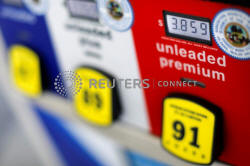Saudi attacks threaten U.S. gasoline price hikes, particularly in
California
 Send a link to a friend
Send a link to a friend
 [September 16, 2019] By
Devika Krishna Kumar [September 16, 2019] By
Devika Krishna Kumar
NEW YORK (Reuters) - U.S. motorists most
likely to feel the hit from rising gas prices following the attacks on
Saudi Arabia's oil facilities are on the West Coast, which accounts for
nearly half of all of U.S. crude imports from the kingdom.
The attacks on Saudi Arabia's oil facilities on Saturday knocked out
more than 5% of global oil supply and sent oil prices surging as much as
20%.
U.S. pump prices are likely to rise in coming days as gasoline futures
spiked by more than 10% on Sunday trading, analysts said. The national
average price of regular gasoline was currently $2.57 per gallon,
according to AAA.
However, California motorists, some 8,000 miles (13,000 km) away from
Saudi Arabia, could be hit the hardest. Refineries in that state rely
heavily on imports for supplies due to its isolated location and lack of
pipelines to connect it with oil-rich states such as Texas.

Saudi Arabia exports more than 7 million barrels of crude oil every day,
much of that to Asia, but about 47% of what it sends to the United
States goes to the West Coast.
For the 12 months ended in June, the U.S. West Coast imported an average
of 11.40 million barrels every month of Saudi crude, much of it going to
a number of refineries based in California, according to the U.S. Energy
Information Administration.
"I absolutely think it's likely that the West Coast will see more of a
pricing impact than other regions since they're more tied to Saudi
imports," said Patrick DeHaan, head of petroleum analysis at tracking
firm GasBuddy.
Saudi Arabia accounted for about 37 percent of California's total
foreign oil imports in 2018, according to the California Energy
Commission.
"Saudi Arabia has always sought to portray itself as a reliable supplier
of crude to the market and for this reason we think they will opt to
supply the export market for crude first then products," said Robert
Campbell, head of oil products research at Energy Aspects.
[to top of second column] |

The price of gasoline is shown on a gas pump at an Arco gas station
in San Diego, California, U.S. July 11, 2018. REUTERS/Mike
Blake/File Photo

The state currently has the second-highest average gasoline prices in
the United States at $3.63 per regular gallon of gas, trailing only
Hawaii. Fuel prices in California are typically higher due to tight
regulations and differing gasoline specifications.
Among the biggest buyers of Saudi Arabian crude are Chevron Corp's
245,000-barrel-per-day (bpd) refinery in Richmond, California, and the
269,000-bpd El Segundo refinery in California. The West Coast, known as
oil region PADD 5, includes Washington State, which has also taken in
barrels from Saudi Arabia in the last year.
A Chevron spokesman told Reuters the company sources crude from
"multiple global suppliers," and it will "take the necessary actions to
continue to meet the needs of the marketplace."
The United States has more than 640 million barrels of oil in reserve
that could offset tighter supply as a result of the Saudi attacks. U.S.
President Donald Trump said on Sunday he authorized the release of oil
from the U.S. Strategic Petroleum Reserve (SPR) if needed in a quantity
to be determined.
"I don't yet think any area will see 'spikes' because of the attacks,
but it certainly could become that if Saudi Arabia production doesn't
return to 90% of normal very quickly," DeHaan said.

(Reporting by Devika Krishna Kumar in New York; additional reporting by
Stephanie Kelly; Editing by Sandra Maler)
[© 2019 Thomson Reuters. All rights
reserved.] Copyright 2019 Reuters. All rights reserved. This material may not be published,
broadcast, rewritten or redistributed.
Thompson Reuters is solely responsible for this content. |